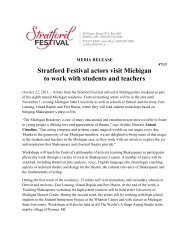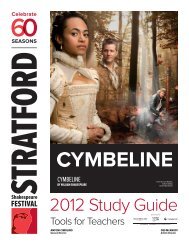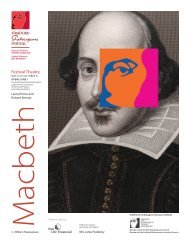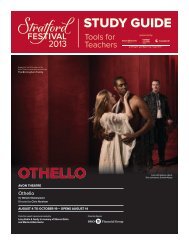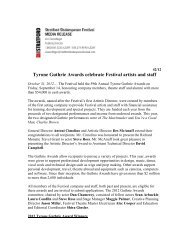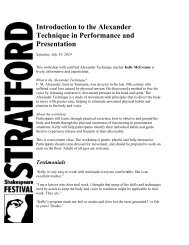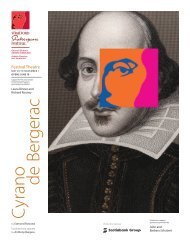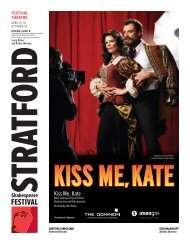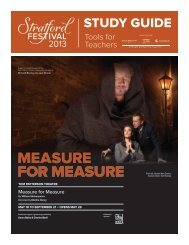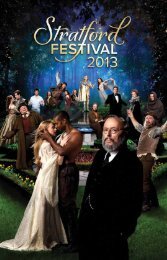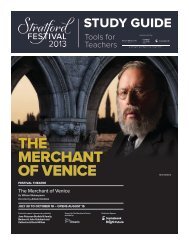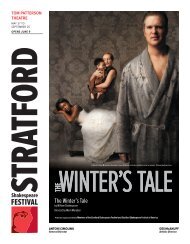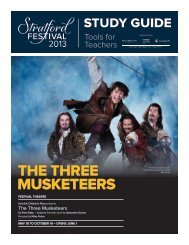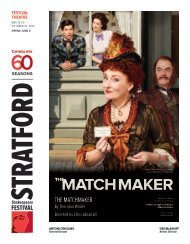Twelfth Night Study Guide - Stratford Festival
Twelfth Night Study Guide - Stratford Festival
Twelfth Night Study Guide - Stratford Festival
Create successful ePaper yourself
Turn your PDF publications into a flip-book with our unique Google optimized e-Paper software.
TWELFTH NIGHT<br />
by William Shakespeare<br />
On bike, from left: Tom Rooney,<br />
Cara Ricketts, Sara Topham, Ben Carlson,<br />
Andrea Runge, Stephen Ouimette<br />
Foreground: Brian Dennehy<br />
2011 <strong>Study</strong> <strong>Guide</strong><br />
Tools for Teachers<br />
Antoni Cimolino<br />
General Director<br />
sponsored by<br />
Des McAnuff<br />
Artistic Director
Table of Contents<br />
The Place<br />
The <strong>Stratford</strong> Story ................................................................................................. 1<br />
The Play<br />
The Playwright: William Shakespeare ...................................................................3<br />
A Shakespearean Timeline ....................................................................................4<br />
Cast of Characters ................................................................................................ 5<br />
Plot Synopsis ........................................................................................................ 6<br />
Sources and Origins ...............................................................................................7<br />
<strong>Stratford</strong> Production History ................................................................................. 8<br />
Imaginative Ways to Approach the Text<br />
Vice Verse-a! ........................................................................................................ 10<br />
What if? ................................................................................................................. 12<br />
Just a word ........................................................................................................... 13<br />
Discussion Topics for Your Class ......................................................................... 14<br />
Resources ......................................................................................................................... 15
The <strong>Stratford</strong><br />
Story<br />
That <strong>Stratford</strong>, Ontario, is the home of the<br />
largest classical repertory theatre in North<br />
America is ultimately attributable to the dream<br />
of one man, <strong>Stratford</strong>-born journalist Tom<br />
Patterson.<br />
In the early 1950s, seeing the economy of his<br />
home town endangered by the withdrawal of<br />
the railway industry that had sustained it for<br />
nearly eighty years, Patterson conceived the<br />
idea of a theatre festival devoted to the works<br />
of William Shakespeare. His vision won the<br />
support not only of <strong>Stratford</strong> City Council and<br />
an enthusiastic committee of citizens, but also<br />
of the legendary British actor and director<br />
Tyrone Guthrie, who agreed to become the<br />
proposed festival’s first Artistic Director. The<br />
<strong>Stratford</strong> Shakespearean <strong>Festival</strong> of Canada<br />
was incorporated as a legal entity on October<br />
31, 1952. A giant canvas tent was ordered from<br />
a firm in Chicago, and in the parklands by<br />
<strong>Stratford</strong>’s Avon River work began on a<br />
concrete amphitheatre at the centre of which<br />
was to be a revolutionary thrust stage created<br />
to Guthrie’s specifications by internationally<br />
renowned theatrical designer Tanya<br />
Moiseiwitsch.<br />
From the balcony of that stage, on the night of<br />
July 13, 1953, actor Alec Guinness spoke the<br />
opening lines of Richard III: “Now is the winter<br />
of our discontent/ Made glorious summer by<br />
this son of York.” Those words marked the<br />
triumphant end to what had sometimes<br />
seemed a hopeless struggle against the odds<br />
to turn Patterson’s dream into a reality – and<br />
the beginning of an astonishing new chapter in<br />
Canadian theatre history. The other production<br />
of that inaugural six-week season, a moderndress<br />
version of All’s Well That Ends Well,<br />
opened the following night, confirming the<br />
opinion of celebrated novelist Robertson<br />
Davies that the new <strong>Festival</strong> was an<br />
achievement “of historic importance not only in<br />
Canada, but wherever theatre is taken<br />
seriously – that is to say, in every civilized<br />
country in the world.”<br />
Time proved the truth of Davies’ words, for the<br />
<strong>Festival</strong>’s pillared, porticoed thrust stage<br />
revolutionized the performance of classical<br />
and contemporary theatre in the latter half of<br />
the 20th century and inspired the design of<br />
more than a dozen other major venues around<br />
the world, including the Guthrie Theatre in<br />
Minneapolis, the Beaumont Theatre at Lincoln<br />
Centre and, in England, the Chichester <strong>Festival</strong><br />
Theatre, the Crucible Theatre in Sheffield and<br />
the Olivier Theatre at the Royal National<br />
Theatre in London. Over the years, the <strong>Festival</strong><br />
has made some amendments to the original<br />
design of Moiseiwitsch’s stage, without<br />
changing its essential format.<br />
At the end of the 1956 season, the giant<br />
canvas tent that had housed the <strong>Festival</strong>’s first<br />
four seasons was dismantled for the last time<br />
to make way for a new and permanent facility<br />
to be erected around the existing stage.<br />
Designed by architect Robert Fairfield, the new<br />
building would be one of the most distinctive in<br />
<strong>Twelfth</strong> <strong>Night</strong> <strong>Study</strong> <strong>Guide</strong><br />
<strong>Stratford</strong> Shakespeare <strong>Festival</strong> 2011<br />
1
the world of the performing arts: its circular<br />
floor plan and crenellated roof paying striking<br />
tribute to the <strong>Festival</strong>’s origins under canvas.<br />
In the years since its first season, the <strong>Stratford</strong><br />
Shakespeare <strong>Festival</strong> has set benchmarks for<br />
the production not only of Shakespeare,<br />
Molière, the ancient Greeks and other great<br />
dramatists of the past, but also of such 20thcentury<br />
masters as Samuel Beckett, Bertolt<br />
Brecht, Anton Chekhov, Henrik Ibsen, Eugene<br />
O’Neill and Tennessee Williams. In addition to<br />
acclaimed productions of the best in operetta<br />
and musical theatre, it has also showcased –<br />
and in many cases premièred – works by<br />
outstanding Canadian and other contemporary<br />
playwrights.<br />
Its artists have included the finest actors,<br />
directors and designers in Canada and abroad.<br />
Among the internationally renowned<br />
performers who have graced its stages are<br />
Alan Bates, Brian Bedford, Douglas Campbell,<br />
Len Cariou, Brent Carver, Hume Cronyn, Colm<br />
Feore, Megan Follows, Lorne Greene, Paul<br />
Gross, Uta Hagen, Julie Harris, Martha Henry,<br />
William Hutt, James Mason, Eric McCormack,<br />
Seana McKenna, Loreena McKennitt, Richard<br />
Monette, John Neville, Nicholas Pennell,<br />
Christopher Plummer, Sarah Polley, Douglas<br />
Rain, Kate Reid, Jason Robards, Paul Scofield,<br />
William Shatner, Maggie Smith, Jessica Tandy,<br />
Peter Ustinov and Al Waxman.<br />
Drawing audiences of more than 500,000<br />
each year, the <strong>Festival</strong> season now runs from<br />
April to November, with productions being<br />
presented in four unique theatres, and<br />
includes a full program of Beyond the Stage<br />
activities including concerts, discussion<br />
sessions, lectures and readings. It offers an<br />
extensive program of educational activities for<br />
students, teachers and other patrons, and<br />
operates its own in-house school of<br />
professional artist development: The<br />
Birmingham Conservatory for Classical<br />
Theatre.<br />
The original <strong>Festival</strong> tent is draped over the thrust stage in preparation<br />
for the first season, 1953.<br />
<strong>Twelfth</strong> <strong>Night</strong> <strong>Study</strong> <strong>Guide</strong><br />
<strong>Stratford</strong> Shakespeare <strong>Festival</strong> 2011<br />
2
The Playwright:<br />
William Shakespeare<br />
Born in <strong>Stratford</strong>-upon-Avon, a small<br />
Warwickshire town, in 1564, William<br />
Shakespeare was the eldest son of John<br />
Shakespeare, a glover, and Mary Arden, the<br />
daughter of a wealthy farmer. The exact date<br />
of his birth is unknown, but baptismal records<br />
point to it being the same as that of his death,<br />
April 23. He probably attended what is now the<br />
Edward VI Grammar School, where he would<br />
have studied Latin literature, and at 18, he<br />
married a farmer’s daughter, Anne Hathaway,<br />
with whom he had three children: Susanna,<br />
born in 1583, and, two years later, the twins<br />
Hamnet (who died in childhood) and Judith.<br />
1623, fellow dramatist Ben Jonson called him a<br />
man “not of an age, but for all time”. Not only<br />
did Shakespeare write some of the most<br />
popular plays of all time, but he was a very<br />
prolific writer, writing 38 (canonically accepted)<br />
works in 23 years. His work covered many<br />
subjects and styles, including comedies,<br />
tragedies, histories and romances, all bearing<br />
his hallmark expansive plots, extraordinary<br />
language and humanist themes. Shakespeare<br />
enjoyed great popularity in his lifetime, and<br />
400 years later, he is still the most produced<br />
playwright in the world.<br />
Nothing further is known of his life until 1592,<br />
when his earliest known play, the first part of<br />
Henry VI, became a hit in London, where<br />
Shakespeare was now working as an actor.<br />
Soon afterwards, an outbreak of the plague<br />
forced the temporary closure of the theatres,<br />
and Shakespeare turned for a while to writing<br />
poetry. By 1594, however, he was back in the<br />
theatre, acting with the Lord Chamberlain’s<br />
Men. He quickly established himself as one of<br />
London’s most successful dramatists, with an<br />
income that enabled him, in 1597, to buy a<br />
mansion back in <strong>Stratford</strong>. In 1599 he became<br />
a shareholder in London’s newly built Globe<br />
Theatre.<br />
In 1603, Shakespeare’s company was awarded<br />
a royal patent, becoming known as the King’s<br />
Men. Possibly as early as 1610, the playwright<br />
retired to his home in <strong>Stratford</strong>-upon-Avon,<br />
living there – and continuing to invest in real<br />
estate – until his death on April 23, 1616. He is<br />
buried in the town’s Holy Trinity Church.<br />
In the first collected edition of his works in<br />
<strong>Twelfth</strong> <strong>Night</strong> <strong>Study</strong> <strong>Guide</strong><br />
<strong>Stratford</strong> Shakespeare <strong>Festival</strong> 2011<br />
3
A Shakespearean Timeline<br />
1558 Elizabeth I crowned.<br />
1564 William Shakespeare born.<br />
1572 Actors not under the protection of a patron declared rogues and vagabonds.<br />
1576 “The Theatre,” the first public playhouse in London, opens.<br />
1577 “The Curtain,” London’s second playhouse, opens.<br />
1578 James VI (later James I of England) takes over government of Scotland.<br />
1579 Publication of North’s English translation of Plutarch’s Lives of the Noble Grecians and<br />
Romans.<br />
1580 Francis Drake returns in triumph form his voyage around the world; travelling players<br />
perform at <strong>Stratford</strong>.<br />
1582 Shakespeare marries Anne Hathaway; Susanna is born six months later and the twins<br />
Hamnet and Judith in 1585.<br />
1587 “The Rose” theatre opens in London. Mary Queen of Scots is executed.<br />
1588 Spanish Armada defeated.<br />
1589 Shakespeare finds work as an actor in London; he lives apart from his wife for 21 years.<br />
1590-1591 The Two Gentlemen of Verona, The Taming of the Shrew.<br />
1591 2 Henry VI, 3 Henry VI.<br />
1592 Thousands die of plague in London; theatres closed. 1 Henry VI, Titus Andronicus,<br />
Richard III.<br />
1593 The Comedy of Errors.<br />
1594 Shakespeare becomes a shareholder of his theatre company, the Lord Chamberlain’s<br />
Men.<br />
1594 Love’s Labour’s Lost.<br />
1595 Richard II, Romeo and Juliet, A Midsummer <strong>Night</strong>’s Dream.<br />
1596 Shakespeare’s son, Hamnet, dies.<br />
1596-1597 King John, The Merchant of Venice, 1 Henry IV.<br />
1597-1598 The Merry Wives of Windsor, 2 Henry IV, Much Ado About Nothing.<br />
1598 “The Globe” theatre built.<br />
1598-1599 Henry V, Julius Caesar.<br />
1599-1600 As You Like It.<br />
1600-1601 Hamlet, <strong>Twelfth</strong> <strong>Night</strong>.<br />
1601 Shakespeare’s patron arrested for treason following the Essex rebellion; he is later<br />
<strong>Twelfth</strong> <strong>Night</strong> <strong>Study</strong> <strong>Guide</strong><br />
<strong>Stratford</strong> Shakespeare <strong>Festival</strong> 2011<br />
4
pardoned.<br />
1602 Troilus and Cressida.<br />
1603 Queen Elizabeth dies and is succeeded by James I; Shakespeare’s theatre company<br />
becomes the King’s Men.<br />
1603 Measure for Measure, Othello.<br />
1604 Work begins on the King James Bible.<br />
1604-1605 All’s Well That Ends Well, Timon of Athens, King Lear (Q)<br />
1606 Macbeth, Antony and Cleopatra.<br />
1607 Pericles.<br />
1608 Coriolanus.<br />
1609 The Winter’s Tale.<br />
1610 King Lear (F), Cymbeline.<br />
1610 Shakespeare retires to <strong>Stratford</strong>-upon-Avon.<br />
1611 The Tempest.<br />
1611 King James Bible published.<br />
1613 Henry VIII (All Is True), The Two Noble Kinsmen.<br />
1613 “The Globe” theatre burns down.<br />
1616 Shakespeare dies in <strong>Stratford</strong>-upon-Avon.<br />
Cast of Characters<br />
Orsino, Duke of Illyria<br />
Valentine attending on<br />
Curio<br />
Orsino<br />
First Officer<br />
Second Officer<br />
Viola, a lady, disguised as Cesario<br />
A Captain<br />
Sebastian, Viola’s twin brother<br />
Antonio, another sea-captain<br />
Olivia, a Countess<br />
Maria, her waiting-gentlewoman<br />
Sir Toby Belch, Olivia’s kinsman<br />
Sir Andrew Aguecheek, companion of Sir Toby<br />
Malvolio, Olivia’s steward<br />
Fabian, a member of Olivia’s household<br />
Feste, the Clown, her jester<br />
A Priest<br />
A Servant of Olivia<br />
Musicians, sailors, lords, attendants<br />
<strong>Twelfth</strong> <strong>Night</strong> <strong>Study</strong> <strong>Guide</strong><br />
<strong>Stratford</strong> Shakespeare <strong>Festival</strong> 2011<br />
5
Plot Synopsis<br />
Separated in a storm at sea, twins Viola and Sebastian are washed ashore on different parts of<br />
the coast of Illyria, each believing the other to be drowned. To protect herself in this unknown<br />
land, Viola disguises herself as a young man, Cesario, and enters the service of Duke Orsino.<br />
Viola’s male disguise proves all too effective, however, when Orsino employs her as a gobetween<br />
in his persistent love-suit to the unresponsive Countess Olivia; for Olivia, while still<br />
disdaining Orsino, falls immediately in love with his emissary.<br />
Meanwhile, Olivia’s uncle, Sir Toby Belch, the maid Maria, the hanger-on Sir Andrew Aguecheek<br />
and the clown Feste play a practical joke on Malvolio, Olivia’s self-righteous steward. Tricked into<br />
thinking that Olivia is in love with him, and acting on what he believes to be her instructions,<br />
Malvolio makes such a fool of himself that he is confined as a madman. Confusion reigns until<br />
Viola and Sebastian are reunited, Malvolio is freed and all is explained.<br />
<strong>Twelfth</strong> <strong>Night</strong> <strong>Study</strong> <strong>Guide</strong><br />
<strong>Stratford</strong> Shakespeare <strong>Festival</strong> 2011<br />
6
Sources and Origins<br />
Written sometime between 1599 and 1601, <strong>Twelfth</strong> <strong>Night</strong>, or What You Will is the last of the socalled<br />
“mature comedies” (the others being Much Ado About Nothing and As You Like It) that<br />
Shakespeare wrote before embarking on the series of great tragedies that began with Hamlet.<br />
For many people, <strong>Twelfth</strong> <strong>Night</strong> represents his supreme achievement in the genre of romantic<br />
comedy.<br />
The play’s title refers to the Christian festival of Epiphany (the visit of the Magi to the infant Jesus)<br />
on January 6, 12 days after Christmas. This was traditionally a time of merry-making, and<br />
although there is no further allusion to <strong>Twelfth</strong> <strong>Night</strong> in the text, a holiday atmosphere does<br />
prevail in the play.<br />
The play’s alternative title contains a pun, will being an Elizabethan synonym for sexual desire.<br />
What You Will may have been the original title and may have been dropped when another play<br />
with the same title, written by John Marston, appeared in 1601.<br />
The origins of <strong>Twelfth</strong> <strong>Night</strong> may be traced back to a popular Italian play called Gl’Ingannati (The<br />
Deceived) that was published anonymously in 1537. Though none of the characters’ names are<br />
the same, the relationships between Viola, Sebastian, Orsino and Olivia clearly derive from<br />
Gl’Ingannati, though it appears that Shakespeare drew only indirectly from that source.<br />
Another Italian writer, Matteo Bandello, included a prose adaptation of Gl’Ingannati in his book<br />
Novelle, a collection of romances compiled between 1554 and 1573 (and in which the source<br />
stories for Much Ado About Nothing and John Webster’s The Duchess of Malfi may also be<br />
found). Novelle was then translated into French as Histoires Tragiques by François de Belleforest<br />
and Pierre Boaistuau.<br />
An English writer, Barnabe Riche, drew on Histoires Tragiques for his “Of Apolonius and Silla,”<br />
the second in a collection of stories that he published as Fairwell to Militarie Profession in 1581,<br />
and it was on that version of the story that Shakespeare is believed to have based <strong>Twelfth</strong> <strong>Night</strong>.<br />
Some critics have speculated that Shakespeare based the character of Malvolio on a<br />
contemporary public figure, one candidate being Sir William Knollys, uncle of the Earl of Essex<br />
and comptroller of Queen Elizabeth I’s household from 1596 to 1602.<br />
<strong>Twelfth</strong> <strong>Night</strong> <strong>Study</strong> <strong>Guide</strong><br />
<strong>Stratford</strong> Shakespeare <strong>Festival</strong> 2011<br />
7
<strong>Stratford</strong> Production History<br />
This is the 11th production of <strong>Twelfth</strong> <strong>Night</strong> at the <strong>Stratford</strong> Shakespeare <strong>Festival</strong> and the ninth to<br />
be presented at the <strong>Festival</strong> Theatre.<br />
1957 (<strong>Festival</strong> Theatre): Directed by Tyrone Guthrie, with Lloyd Bochner as Orsino, Douglas<br />
Campbell as Sir Toby Belch, Bruno Gerussi as Feste, Frances Hyland as Olivia, Siobhan McKenna<br />
as Viola, Christopher Plummer as Sir Andrew Aguecheek and Douglas Rain as Malvolio. Designed<br />
by Tanya Moiseiwitsch. Music by John Cook.<br />
1966 (<strong>Festival</strong> Theatre): Directed by David William, with Eric Christmas as Feste, Leo Ciceri as<br />
Malvolio, Martha Henry as Viola, Roberta Maxwell as Olivia, Richard Monette as Sebastian,<br />
Christopher Newton as Orsino, Briain Petchey as Sir Andrew Aguecheek and Douglas Rain as Sir<br />
Toby Belch. Designed by Brian Jackson. Music by Louis Applebaum.<br />
1975 (<strong>Festival</strong> Theatre): Directed by David Jones, with Brian Bedford as Malvolio, Tom<br />
Kneebone as Feste, Stephen Macht and Michael Fletcher as Orsino, Frank Maraden as Sir<br />
Andrew Aguecheek, Marti Maraden as Olivia, Kathleen Widdoes as Viola and Leslie Yeo as Sir<br />
Toby Belch. Designed by Susan Benson. Music by Harry Freedman.<br />
1980 (<strong>Festival</strong> Theatre): Directed by Robin Phillips, with Brian Bedford as Malvolio, Patricia<br />
Conolly as Viola, Pat Galloway as Olivia, William Hutt as Feste, Barry MacGregor as Sir Toby<br />
Belch, Richard McMillan as Sir Andrew Aguecheek and Jim McQueen as Orsino. Set design by<br />
Daphne Dare; costume design by Ann Curtis. Music by Berthold Carrière.<br />
1985 (<strong>Festival</strong> Theatre): Directed by David Giles, with Edward Atienza as Feste, James Blendick<br />
as Sir Toby Belch, Colm Feore as Orsino, Seana McKenna as Viola, Nicholas Pennell as Malvolio,<br />
Maria Ricossa as Olivia and Joseph Ziegler as Sir Andrew Aguecheek. Designed by Christina<br />
Poddubiuk. The production was re-directed by John Hirsch for a tour to Los Angeles, Seattle,<br />
Chicago, Palm Beach, Fort Lauderdale and Washington, D.C. It was also filmed by the CBC during<br />
rehearsals for the tour and is available on videocassette.<br />
1988 (Third Stage, now the Tom Patterson Theatre): Directed by Robin Phillips, with Susan<br />
Coyne as Olivia, Peter Donaldson as Malvolio, Kevin Gudahl as Orsino, John Ormerod as Sir<br />
Andrew Aguecheek, Nancy Palk as Viola, Albert Schultz as Feste and William Webster as Sir Toby<br />
Belch. Set design by Elis Y. Lam; costume design by Abram Waterhouse. Music by Berthold<br />
Carrière.<br />
1991 (Avon Theatre): Directed by Bernard Hopkins, with Douglas Chamberlain as Feste, Juan<br />
Chioran as Orsino, William Dunlop as Sir Toby Belch, Julia Lenardon as Olivia, Rod Menzies as Sir<br />
Andrew Aguecheek, Albert Millaire as Malvolio and Anne Wright as Viola. Set design by Gary<br />
Thomas Thorne; costume design by Ann Curtis. Music by Roger Perkins.<br />
1994 (<strong>Festival</strong> Theatre): Directed by Richard Monette, with Brian Bedford as Feste, Lewis<br />
Gordon as Sir Toby Belch, Stephen Ouimette as Sir Andrew Aguecheek, Lucy Peacock as Viola,<br />
Alison Sealy-Smith as Olivia, Scott Wentworth as Orsino and David William as Malvolio. Designed<br />
by Debra Hanson. Music by Stanley Silverman.<br />
2001 (<strong>Festival</strong> Theatre): Directed by Antoni Cimolino, with Sean Arbuckle as Orsino, James<br />
Blendick as Sir Toby Belch, Domini Blythe as Maria, Peter Donaldson as Malvolio, Michelle Giroux<br />
as Olivia, William Hutt as Feste, Robert King as Antonio, Tara Rosling as Viola, Michael Therriault<br />
<strong>Twelfth</strong> <strong>Night</strong> <strong>Study</strong> <strong>Guide</strong><br />
<strong>Stratford</strong> Shakespeare <strong>Festival</strong> 2011<br />
8
as Sir Andrew Aguecheek and Nicolas Van Burek as Sebastian. Set design by Peter Hartwell;<br />
costume design by Francesca Callow. Music by Jim Neil.<br />
2006 (<strong>Festival</strong> Theatre): Directed by Leon Rubin, with Brian Bedford as Malvolio, Don Carrier as<br />
Sir Andrew Aguecheek, Diane D’Aquila as Maria, Dana Green as Viola, Thom Marriott as Sir Toby<br />
Belch, Andrew Massingham as Feste, Shaun McComb as Sebastian, Seana McKenna as Olivia<br />
and Sanjay Talwar as Orsino. Set and costume design by John Pennoyer. Music by Michael<br />
Viera.<br />
<strong>Twelfth</strong> <strong>Night</strong> <strong>Study</strong> <strong>Guide</strong><br />
<strong>Stratford</strong> Shakespeare <strong>Festival</strong> 2011<br />
9
Imaginative Ways to Approach the Text:<br />
Vice Verse-a! 1<br />
Grade Level 7 - 12<br />
Ontario Listening to Understand<br />
Curriculum Speaking to Communicate<br />
Expectations Reading for Meaning<br />
Time Needed One class period<br />
Space<br />
Regular classroom set up<br />
Materials Copies of 1.1.1-15 for each student<br />
Background:<br />
Up until the late 1500s, all English plays were written in verse (poetry). Hence, playwrights in<br />
Shakespeare’s day were called poets. Audiences in Shakespeare’s day expected to hear the<br />
actors speak in verse. This formal style of language supported the ritual roots of drama and was<br />
felt to be particularly suitable for the kings, great affairs of war and state, or tragic themes<br />
depicted in the plays of the time. Shakespeare’s verse is written in iambic pentameter (which<br />
simply means that each line has five stresses). Typically, the five stressed (/) syllables alternate<br />
with five unstressed (x) syllables, giving a ten-syllable line. To help students feel the rhythm, have<br />
them tap out the stresses:<br />
x / x / x / x / x /<br />
But soft what light through yonder window breaks?<br />
Ask students to listen to their heartbeat to hear the basic rhythm of the weak and strong<br />
stresses: de-dum, de-dum, de-dum.<br />
Actors always try to ensure that the verse does not sound boring and monotonous on stage.<br />
They use the clues that Shakespeare provides to match the rhythm to the thought and feeling of<br />
the characters.<br />
In Shakespeare early plays, like Titus Andronicus (which is playing at the Tom Patterson Theatre<br />
in <strong>Stratford</strong> this season), the rhythm of the verse tends to be very regular. The lines are often<br />
‘end-stopped’, each line making sense on its own, with a pause at t he end of the line. Titus<br />
speaks in this structured, formal style, even at the most melodramatic moments, as for example<br />
when he threatens to the two men he intends to kill and bake in a pie:<br />
Hark, villains, I will grind your bones to dust,<br />
And with your blood and it I’ll make a paste,<br />
And of the paste a coffin I will rear,<br />
And make two pasties of your shameful heads.<br />
As Shakespeare’s playwriting developed, he played more with the rhythm of the verse and used<br />
fewer end-stopped lines. He make greater use of enjambement (running on) where one line<br />
flows on into the next, seemingly without pause. Macbeth, for example, contains a great deal of<br />
enjambement:<br />
I have lived long enough. My way of life<br />
Is fall’n into the sere, the yellow leaf.<br />
1 Adapted from an exercise from Shakespeare’s Language by Rex Gibson<br />
<strong>Twelfth</strong> <strong>Night</strong> <strong>Study</strong> <strong>Guide</strong><br />
<strong>Stratford</strong> Shakespeare <strong>Festival</strong> 2011<br />
10
The exercise:<br />
Have students turn the following passage from the opening of <strong>Twelfth</strong> <strong>Night</strong> back into<br />
verse lines. Remind them that there are usually 10 syllables in each line (5 sets of one<br />
unstressed and one stressed syllable), but because Shakespeare used verse so flexibly,<br />
it is best to speak the words aloud, trying to find the rhythm and the most natural place<br />
to begin the next verse line.<br />
<strong>Twelfth</strong> <strong>Night</strong>: 1.1.1-15.<br />
If music be the food of love play on give me excess of it that surfeiting the appetite may sicken<br />
and so die that strain again it had a dying fall o it came oer my ear like the sweet sound that<br />
breathes upon a bank of violets stealing and giving odour enough no more tis not so sweet now<br />
as it was before o spirit of love how quick and fresh art thou that notwithstanding thy capacity<br />
receiveth as the sea naught enters there of what validity and pitch soeer but falls into abatement<br />
and low price even in a minute so full of shapes is fancy that it alone is high fantastical<br />
<strong>Twelfth</strong> <strong>Night</strong> <strong>Study</strong> <strong>Guide</strong><br />
<strong>Stratford</strong> Shakespeare <strong>Festival</strong> 2011<br />
11
Imaginative Ways to Approach the Text:<br />
What if?<br />
Grade Level 7 - 12<br />
Ontario Listening to Understand<br />
Curriculum Speaking to Communicate<br />
Expectations Drama: Creation<br />
Time Needed One class period<br />
Space<br />
Clear space in the classroom for students to work in small groups<br />
Materials Cards with “What if” situations written on them<br />
Overview:<br />
This is an introductory exercise for <strong>Twelfth</strong> <strong>Night</strong> and introduces students to some of the<br />
situations in the play as well as the festive mode of the play.<br />
The exercise:<br />
Organize the class into small groups.<br />
Give each group a care with one of the following “What If” situations written on it (they<br />
are goofy and childish, but that is the point!):<br />
- What if all the students became teachers and all the teachers became students?<br />
- What if there were three people with this situation: A loves B, who loves C, who<br />
loves A?<br />
- What if everyone woke up one morning and found they had turned into the<br />
opposite sex?<br />
- What if everyone in this room looked exactly alike?<br />
Give each group ten minutes to brainstorm a list of things that would happen if their<br />
“What If” situation took place.<br />
Give the groups ten more minutes to devise short skits portraying one of their “What If”<br />
ideas. Have each group present its skit for the class.<br />
Reflect:<br />
After the skits, tell the class that they’ve just done a <strong>Twelfth</strong> <strong>Night</strong> activity and explain the<br />
Elizabethan <strong>Twelfth</strong> <strong>Night</strong> custom. <strong>Twelfth</strong> <strong>Night</strong> was a time for pranks and disguises,<br />
playful games and folly. This is the atmosphere of Illyria – a country where everyone is<br />
very earnest, but also a little insane!<br />
The quality of the skits and the responses to them will indicate the extent to which<br />
students will relax into the <strong>Twelfth</strong> <strong>Night</strong> mode. If you have students who consider<br />
themselves too mature for such foolishness, assure them that this type of exploration of<br />
<strong>Twelfth</strong> <strong>Night</strong> might be light-hearted but it is not intellectually inferior. It will stimulate<br />
their minds as well as their sense of playfulness.<br />
*Courtesy of the Folger Shakespeare Library’s Shakespeare Set Free series.<br />
<strong>Twelfth</strong> <strong>Night</strong> <strong>Study</strong> <strong>Guide</strong><br />
<strong>Stratford</strong> Shakespeare <strong>Festival</strong> 2011<br />
12
Imaginative Ways to Approach the Text:<br />
Just a word<br />
Grade Level<br />
Ontario<br />
Curriculum<br />
Expectations<br />
Time Needed<br />
Space<br />
Materials<br />
all<br />
Listening to Understand<br />
Speaking to Communicate<br />
Drama: Creation<br />
One class period<br />
Clear space in the classroom for students to work in small groups<br />
Copies of Act 1, Scene 4 of <strong>Twelfth</strong> <strong>Night</strong> for all students<br />
Overview:<br />
This activity reduces the number of words in a scene to the bare essentials - usually one word<br />
for each speech. This activity is very helpful for: involving students who are not confident<br />
speaking large sections of Shakespeare’s text; getting at the “heart” of the scene; finding<br />
patterns in the language. By selecting words in this fashion and speaking chorally, students are<br />
highlighting meanings in the text.<br />
The exercise:<br />
Part 1<br />
Divide the students into groups of three and handout copies of Act 1, Scene 4 from<br />
<strong>Twelfth</strong> <strong>Night</strong>. Have them cast themselves as Valentine, Viola, and Orsino and read<br />
through the scene<br />
Next, ask the students to decide, with their playing partners, which words best tell the<br />
story of the scene. Generally, each speech/line by a character may be reduced to a<br />
single word. Groups will then rehearse this mini-scene using only the words chosen.<br />
Direct students to find a gesture for each word. Encourage students to make their<br />
movements as big and as specific as possible in order to clarify their interpretive choices.<br />
<br />
Part 2<br />
<br />
<br />
Have groups volunteer to present their version of the scene to the rest of the class.<br />
Discuss the variations in choices made by each group and how clearly the overall<br />
message of the scene is communicated though the use of these essential words and<br />
gesture.<br />
Divide the class into three groups. One group will be Valentine, one group will be<br />
Orsino, and one group will be Viola. Each group will elect a choral leader for the role.<br />
(The choral leader should be a student who is comfortable reading the full text of the<br />
scene for that character).<br />
The class will now enact the scene. The choral leaders will take on the parts of<br />
Valentine, Viola and Orsino with their individual choruses gathered behind them. The<br />
chorus echoes all the words spoken by their leader which they want to emphasize.<br />
These choices may be made spontaneously or may be planned in advance within these<br />
new groups based on their experience in smaller groups in part 1 and the discussion<br />
which ensued. Echoed words and gestures should occur immediately after the choral<br />
leader speaks them and before another word is spoken (either by the choral leader or<br />
another character).<br />
*adapted from an idea in the RSC Shakespeare Toolkit for Teachers.<br />
<strong>Twelfth</strong> <strong>Night</strong> <strong>Study</strong> <strong>Guide</strong><br />
<strong>Stratford</strong> Shakespeare <strong>Festival</strong> 2011<br />
13
Discussion Topics for Your Class<br />
For classes reading the play before seeing it:<br />
1. What do you expect to see on stage at the <strong>Stratford</strong> Shakespeare <strong>Festival</strong>? Have each student<br />
make a list of predictions about what they expect. Save these predictions. After your <strong>Stratford</strong><br />
trip, revisit them to see how they compared to the actual production.<br />
2. Create a character web showing how all the characters are connected to each other. Discuss<br />
the complexity of these relationships and how they affect the progression of the play.<br />
After your <strong>Stratford</strong> trip:<br />
1. <strong>Twelfth</strong> <strong>Night</strong> has appealed to artists and audiences around the world for 400 years. What do<br />
you think the play’s message is?<br />
2. What parts did you respond to most?<br />
3. Were there parts you wished were different? How?<br />
For more classroom activities, complete with instructions, materials and Ontario<br />
curriculum expectation links, visit<br />
stratfordshakespearefestival.com/teachingmaterials.<br />
<strong>Twelfth</strong> <strong>Night</strong> <strong>Study</strong> <strong>Guide</strong><br />
<strong>Stratford</strong> Shakespeare <strong>Festival</strong> 2011<br />
14
Resources<br />
SHAKESPEARE: HISTORY, CRITICISM AND BIOGRAPHY<br />
Beckerman, Bernard. Shakespeare and the Globe, 1599-1609. 1962.<br />
Bentley, G.E. Shakespeare: A Biographical Handbook. 1951.<br />
Boyce, Charles. Shakespeare A to Z. 1990.<br />
Brown, Ivor. Shakespeare and the Actors. 1970.<br />
Brown, John Russell. Shakespeare and his Theatre.<br />
Burgess, Anthony. Shakespeare. 1970.<br />
Campbell, Oscar James, ed. The Reader’s Encyclopedia of Shakespeare. 1966.<br />
Dobson, Michael, ed. The Oxford Companion to Shakespeare. 2001.<br />
Epstein, Norrie. The Friendly Shakespeare. 1992.<br />
Frye, R. M. Shakespeare’s Life and Times: a Pictorial Record. 1067.<br />
Gurr, Andrew. The Shakespearean Stage, 1574-1642. 1980.<br />
Hodges, C. Walter. Shakespeare and the Players. 1948.<br />
Muir, Kenneth and Samuel Schoenbaum, eds. A New Companion to Skakespeare Studies, 1985.<br />
Nagler, A. M. Shakespeare’s Stage. 1985.<br />
Schoenbaum, Samuel. William Shakespeare: A Documentary Life. 1975.<br />
Taylor, Gary. Reinventing Shakespeare. 1989.<br />
Thomson, Peter. Shakespeare’s Theatre. 1983.<br />
Tillyard, E. M. W. The Elizabethan World Picture. 1943.<br />
Wells, Stanley, ed. The Cambridge Companion to Shakespeare Studies. 1986.<br />
TEACHING SHAKESPEARE<br />
Asimov, Isaac. Asimov’s <strong>Guide</strong> to Shakespeare. New York, 1970.<br />
Edens, Walter, et al. Teaching Shakespeare. New Jersey: Princeton UP, 1977.<br />
Gibson, Rex. Secondary School Shakespeare. Cambridge: 1990.<br />
O’Brien, Veronica. Teaching Shakespeare. London, 1982.<br />
TWELFTH NIGHT<br />
Burdett, Lois & Coburn, Christine. <strong>Twelfth</strong> <strong>Night</strong> for Kids. Firefly Books: 1994.<br />
Garfield, Leon. Shakespeare Stories. Puffin Books: 1985<br />
Gibson, Rex. Teaching Shakespeare. 1998.<br />
Gibson, Rex & Field-Pickering, Janet. Discovering Shakespeare’s Language. Cambridge: 1998.<br />
Shakespeare, William. <strong>Twelfth</strong> <strong>Night</strong>. 2 nd Edition. Cambridge School. 2005.<br />
Somerset, Alan. “Paired to Perfection Much Ado About Nothing and <strong>Twelfth</strong> <strong>Night</strong>”. <strong>Stratford</strong> for<br />
Students. Spring 2006<br />
Trask, Jane. Introduction to Shakespeare: <strong>Twelfth</strong> <strong>Night</strong>. Alta Zena Publications: 1998.<br />
WEB RESOURCES<br />
Mr. William Shakespeare and the Internet, http://shakespeare.palomar.edu<br />
Sh:in:E Shakespeare in Europe, http://www.unibas.ch/shine<br />
<strong>Twelfth</strong> <strong>Night</strong> <strong>Study</strong> <strong>Guide</strong><br />
<strong>Stratford</strong> Shakespeare <strong>Festival</strong> 2011<br />
15
Feste: database of productions at the Royal Shakespeare Company and Shakespeare Memorial<br />
Theatre, http://www.pads.ahds.as.uk:81/shakespeare<br />
Encyclopaedia Britannica presents: Shakespeare and the Globe: Then and Now,<br />
http://search.eb.com/shakespeare<br />
Shakespeare: Chill with Will, http://library.thinkquest.org/19539/saam.htm<br />
Shakespeare’s Life and Times, http://web.uvic.ca/shakespeare/Library/SLT/intro/introsubj.html<br />
Shakespeare Online, http://www.shakespeare-online.com<br />
Poor Yorick CD & VIDEO Emporium, http://www.bardcentral.com<br />
Movie Review Query Engline, http://www.mrqe.com<br />
Internet Movie Database, http://imdb.com<br />
TWELFTH NIGHT ONLINE<br />
MIT Shakespeare Homepage: The Complete Works of William Shakespeare,<br />
http://www-tech.mit.edu/Shakespeare/twelfth_night/index.html<br />
BookRags.com Homepage: http://www.bookrags.com/notes/tn/<br />
<strong>Twelfth</strong> <strong>Night</strong> Revision: http://www.twelfthnightsite.co.uk/<br />
TWELFTH NIGHT ON FILM, VIDEO AND DVD<br />
1996 (UK/Ireland/USA), <strong>Twelfth</strong> <strong>Night</strong>: Or What You Will. Directed by Trevor Nunn; starring Helena<br />
Bonham Carter, Nigel Hawthorne and Ben Kingsley.<br />
1987 (Australia), <strong>Twelfth</strong> <strong>Night</strong>. Directed by Neil Armfield; starring Gillian Jones, Ivor Kants and<br />
Geoffrey Rush.<br />
1969 (UK), <strong>Twelfth</strong> <strong>Night</strong> (TV). Directed by John Sichel; starring Tommy Steele, Alec Guinness and<br />
Joan Plowright.<br />
<strong>Twelfth</strong> <strong>Night</strong> <strong>Study</strong> <strong>Guide</strong><br />
<strong>Stratford</strong> Shakespeare <strong>Festival</strong> 2011<br />
16



